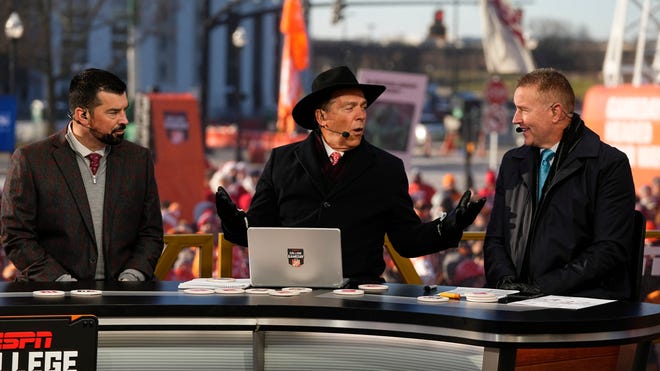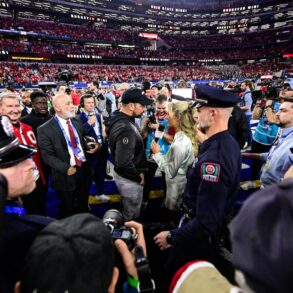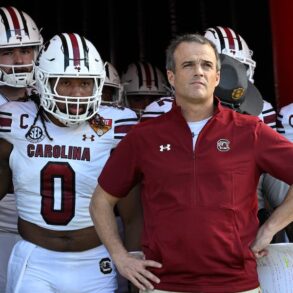BLOOMINGTON – ESPN, the network with its fingerprints all over the expansion of the Playoff from four to 12 teams, turned this weekend into a festival of college football.
It was sometimes hard to tell.
From the almost immediate condemnation of Indiana’s inclusion before Friday’s game even ended, to the seeming need to define Saturday’s games by who didn’t deserve to be there, to the bizarrely slanted conversations about Tennessee and Ohio State in the nightcap, the Worldwide Leader spent a lot of this weekend walking and talking like a network that didn’t care very much for the product it was paying an eye-watering amount of money to put on TV.
Insider:For IU football, the next step is the hardest.
Insider:IU crashed CFP party — and shouldn’t have to apologize for any of it.
Grievance is a quantity as old as the sport itself. Subjectivity has essentially always sat at the root of the way we decide champions in college sports. If anything, football is just beginning to open the nozzle wider, in ways basketball’s done for decades.
Still, there was a bizarrely negative tone to so much of the coverage of this weekend’s first round. Admittedly, it was sometimes difficult to oversell a slate of games none of which was within one possession at halftime and all of which were decided by double digits. But that tone often felt set and cemented less by the games themselves and more by the wider landscape of the weekend.
Maybe some of that was Playoff fatigue. We’ve been talking about the damn thing for weeks, and you could forgive anyone who got to the first round already a little road weary, only to see a set of relative duds land in front of them.
The weekly selection committee rankings are a choice, though. They are entirely a made-for-TV product, one that arguably undercuts the committee’s ability to do its job effectively by forcing it to create parameters for comparing teams before their resumes are fully formed. By and large, basketball waits until the weekend of to stack teams together and separate them accordingly. But if you chase the ratings, you can’t complain about the results.
Around here, fans felt a keen sense of SEC bias, particularly as Indiana’s performance in a loss at Notre Dame seemed to be judged far more harshly than, for example, Tennessee’s loss at Ohio State.
Talking heads seemed eager to pile onto the argument that IU — and to an extent SMU — didn’t belong in the Playoff to begin with, despite the fact that by night’s end Saturday the Hoosiers and Volunteers had a direct point of comparison that very clearly favored Indiana. Playing the same team in the same stadium roughly a month apart, the Hoosiers were more competitive for longer than the SEC team ranked ahead of them.
An SEC team, it should be said, ahead of IU despite putting fewer regular-season wins on the table. Which would seem to run counter to the argument the Hoosiers only got into the field because of their raw win total, something certain sections of national media conveniently ignored in hammering home their Indiana-centric complaints.
To the IU point specifically: There was a compelling argument for both 10-win Tennessee and 10-win Ohio State ahead of 11-win Indiana. Less so nine-win Alabama, but still, an argument at least. The trouble hit when cherry-picked talking points blatantly overlooked equally valid arguments in the other direction, bending the whole thing in a decidedly bad-faith direction.
And the Big Ten more widely might have legitimate complaints, given how focused the conversation seemed to be on things like IU’s disappointing exit or Ryan Day’s job insecurity. The conference putting the only undefeated team into the field at No. 1 got precious little mention, and Penn State barely any credit for obliterating an ACC team less than 24 hours after an ESPN commentator had wondered aloud whether the Big Ten was even better than the ACC to begin with.
But a lot of this, to be fair, boils down to tribal banter. Tread ankle deep into any SEC message board Sunday morning and you were bound to find similar levels of outrage over perceived disrespect for the conference where it just means more. Again, college football does grievance about as well as it does anything else.
What was strangest about the weekend, in its aftermath, was just how negative the whole thing felt. We heard so much more about who failed, who disappointed, who was a fraud, who didn’t deserve to be there, than we did any sort of celebration of a sport that’s almost certainly never been more popular than it is right now.
Make no mistake: There was plenty to celebrate, either in winners (Notre Dame’s biggest postseason victory in years, Penn State’s emergence, Ohio State’s resurgence) or in losers (IU’s best-ever season, Clemson’s recovery, Tennessee’s bright future). Instead, we got a weekend of why the product wasn’t worth the price of admission, from the network that manufactured it to begin with.
It was, to say the least, bizarre.
Listen to Mind Your Banners, our IU Athletics-centric podcast, on Apple Podcasts, Spotify or wherever you get your podcasts.
This post was originally published on this site be sure to check out more of their content.







